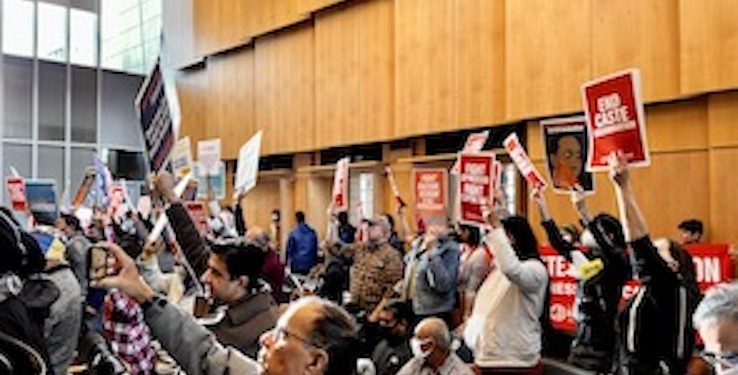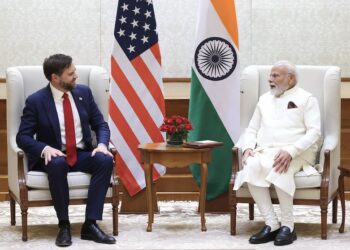What is the caste discrimination ban in Seattle?
On February 21, Seattle made history. After hearing hours of testimony for and against a bill by councilmember Kshama Sawant, the Seattle City Council voted 6–1 to pass her bill and formally ban caste discrimination in the city. This was the first time an American city has explicitly made caste a protected category in its civil rights laws. If a resident of Seattle feels that they have been passed over for a job or promotion, or that they have not been able to rent an apartment because of their caste, they can now petition the city’s Office of Civil Rights to investigate whether or not their rights have been violated.
This bill expands existing civil rights law in Seattle that originally protected people along racial lines, and eventually along religious, ethnic, gender and sexuality lines against discrimination. As these laws expand their protected categories, governments expand their civil rights offices to include experts on the new categories of discrimination. Lawyers who are experts in caste discrimination will likely join the city’s Office of Civil Rights, and other policy experts will begin creating guidelines for Seattle’s various public programmes to ensure that they do not violate caste-oppressed people’s civil rights.
If a resident of Seattle feels that they have been passed over for a job or promotion, or that they have not been able to rent an apartment because of their caste, they now can petition the city’s Office of Civil Rights to investigate whether or not their rights have been violated.
Although this law effectively bars discrimination on caste ‘laws’ in business and public settings, the law cannot protect Seattleites against caste discrimination in private. Like racial, ethnic, religious, gender and sexual minorities in the United States, caste-oppressed communities will continue to face discrimination in social interactions without State protection.
Moreover, Seattle’s law only applies to the parts of the city of Seattle that fall under Seattle’s jurisdiction. For example, if a United States government employee discriminates against a caste-oppressed colleague, Seattle’s jurisdiction may be murkier, as city attorneys may not have the authority to investigate a federal office accused of caste discrimination.
What is the status of caste discrimination in the United States?
According to the nonpartisan international affairs think tank Carnegie Endowment for International Peace, about 47 per cent of Hindu Indian Americans identify with a caste identity, and the overwhelming majority of those who do, said they identify as upper-caste, while 16 per cent identify as Other Backward Class and 1 per cent identify as Scheduled Caste/Scheduled Tribe. The researchers include the caveats that their sample size was small and that the non-responses from those surveyed could convey the fears that lower-caste individuals feel about disclosing their caste identity.
Although Dalit civil rights organisation Equality Labs’ larger study may not have been representative of the larger South Asian American population, this survey is still important to understand how caste discrimination manifests among Dalit and Adivasi Americans — 25 per cent Dalits said they faced physical abuse because of their caste identity, 66 per cent Dalits said they faced employment discrimination, and 33 per cent Dalits said they faced education discrimination.
Caste discrimination arguably affects a small portion of the 331 million-strong population of the United States, yet those who do experience caste discrimination have harrowing stories to tell. Throughout the Seattle City Council Hearing ahead of the vote on the caste discrimination bill, dozens of people came forward with tearful and heart-wrenching stories of the ostracisation, employment discrimination and mental abuse they have faced because of their caste. Others refused to share their full identity with the City Council out of fear of retaliation.
Increasingly, though, employers and universities have recognised the toll that caste identity takes on caste-oppressed people, and major companies like the American multinational technology company Apple, and universities like the California State University (CSU) system and Brown University have banned caste discrimination in their codes of conduct.
When an employee of an American-based multinational digital communications technology conglomerate corporation felt that they had been discriminated against based on their caste, they lodged a complaint with the California Department of Civil Rights. The department, on behalf of the employee, sued Cisco for caste discrimination.
How and why does the Hindu right oppose the fight against caste discrimination?
The American Hindu advocacy group, the Hindu American Foundation (HAF) asked for an injunction in Santa Clara County in support of Cisco and sued the California Department of Civil Rights, claiming that the lawsuit against Cisco violated Hindu Americans’ religious freedom, enshrined in the First Amendment of the United States Constitution.
Professors sued the CSU system alleging that the CSU system’s caste protections discriminated against Indian and Hindu students. In Seattle, the HAF, the Vishwa Hindu Parishad of America (VHPA) (literally, the World Hindu Council of America), an American Hindu organisation, and the Coalition of Hindu Americans of North America (CoHNA), a self-proclaimed ‘grassroots advocacy group representing the Hindu community of North America’, used these same arguments to denounce the city’s caste discrimination bill and organise testimonies against the bill. HAF also promised to sue the City of Seattle.
The Hindu Right, organised by the HAF and the VHPA, have repeatedly stood against efforts to combat caste discrimination, using a few main arguments. First, they argue that caste is complicated. The primary purpose of this argument is to confuse or scare off primarily white jurists from trusting existing research on how caste manifests around the world. It also builds the groundwork for the larger argument that the Hindu Right uses.
Also read: The Hindu American Foundation’s parentage problem: An interview with Sunita Viswanath
Second, and more importantly, they argue that bills like Seattle’s will unfairly discriminate against Indian Americans and Hindu Americans by creating an undue burden to prove that we are not casteist. This argument is both factually and legally unsound. It ignores how Indian and Hindu Americans who experience caste discrimination will benefit from a bill that makes caste a protected category. Instead, the Hindu Right in America wants to erase caste-oppressed Indian and Hindu Americans from the political identities of these two communities.
Why are these arguments unjustified and flawed?
This argument treats Hindu and Indian identity as interchangeable, erasing non-Hindu Indian Americans and non-Indian Hindu Americans. Indian Americans come from all faiths, and many Sikh, Christian and Muslim Indian Americans testified in front of Seattle’s City Council in support of councilmember Sawant’s bill. Likewise, Hindu Americans do not only trace their ancestry back to India. Nepali Americans shared their experiences with caste discrimination with the City Council.
And of course, casteism isn’t confined to just Hindu or even Dharmic communities in India and Nepal. Casteism exists from Pakistan to Northeast India across faith and ethnic lines. In Bangladesh and Pakistan, scholars have documented how untouchability persists even among Muslims in South Asia. All South Asian immigrants, even those from Abrahamic faiths, bring their caste biases with them to their new homes.
The Hindu Right, organised by the Hindu American Foundation and the Vishwa Hindu Parishad of America, have repeatedly stood against efforts to combat caste discrimination.
Legally, the HAF’s argument that a bill protecting caste discrimination will discriminate against Indian and Hindu Americans rests on a supposed violation of existing civil rights law (including the 1964 Civil Rights Act at the federal level) and the First Amendment. If a Hindu American, Indian American, or other South Asian American feels that they are being discriminated against because of their faith, national origin, ethnicity or race, they have legal avenues to pursue justice against their assailants. In the city of Seattle, city, state, and federal law protects people from discrimination based on all of these identities.
On the other hand, despite insistence from the HAF and the CoHNA, those experiencing caste discrimination cannot use previously existing law to pursue cases. The City of Seattle Office of Civil Rights said, “Caste Status is not a recognised protected class in the City of Seattle and if our office were to receive a complaint based solely on caste discrimination, we would not be able to investigate it.”
The Seattle bill and other caste discrimination legislation also does not violate Hindu Americans’ Constitutional right to religious freedom. The Seattle bill does not interrupt Hindus’ ability to worship. There are no restrictions on the ability to conduct pujas, build temples with paid labour, or practice a Hindu lifestyle. The bill would interrupt people’s ability to discriminate against someone based on their caste.
The religious freedom argument has been used by Christian fundamentalists in the United States to refuse service or even marriage licenses to same-sex couples in the years after the United States legalised same-sex marriage. Even before that, white supremacists refused service to interracial couples, again claiming that sexual relationships or reproduction between people of different ethnic groups was somehow a violation of their religious freedom.
Finally, Seattle’s bill does not create an undue burden on upper-caste Americans to prove that they are not casteist. The bill does not ask people to proactively demonstrate the measures they are taking to prevent caste discrimination. Instead, the law gives the Seattle City Office of Civil Rights the legal tools to help Seattleites pursue cases against those who may discriminate against them based on their caste.
As councilmember Sawant said, “To say that protecting lower-caste Indian Americans against discrimination would target Indian Americans from other castes is like saying addressing racism against black and brown people would negatively affect white people.”
And as councilmember Lisa Herbold said ahead of the council vote, “That’s like saying gender discrimination laws single out all men … And just because we have a small population that is experiencing (caste discrimination) that doesn’t make it any less important.”
What does the future of the struggle against caste discrimination in the United States look like?
What happens next with the fight against caste discrimination in the United States is up in the air. The lawsuits in the Cisco and CSU cases will set the boundaries and refine the legal language that future legislators will use to protect caste. And, depending on the lawsuits that the HAF, the VHPA and other Hindu Right activists bring against the city, the United States will learn whether Seattle’s caste discrimination ban will pave the way forward for more cities to replicate this effort, or it will be a fleeting moment in American history.
The Seattle bill does not interrupt Hindus’ ability to worship. There are no restrictions on the ability to conduct pujas, build temples with paid labour, or practice a Hindu lifestyle. The bill would interrupt people’s ability to discriminate against someone based on their caste.
If Seattle succeeds, the momentum will grow. Eventually, larger cities and small, progressive states will take up similar bills. If the efforts to make caste a protected category reach the legislatures of large, blue states like California, New York and Virginia, and succeed, the United States government will have a strong blueprint to tackle caste discrimination. Depending on the makeup of the United States Congress, by the end of the decade, caste discrimination could be banned in the country.
Across the border, in Canada, Indian Americans have been discussing the possibility of including caste as one of the many protected identities in city, state, and federal human rights laws (akin to the United States’s civil rights laws). Australia’s Human Rights Commission is exploring implementing measures to combat caste discrimination. In the United Kingdom, legally, caste discrimination is considered a form of race discrimination, and is therefore supposed to be outlawed. However, this law is not enforced, and in 2018, the Conservative Party-led government committed to repealing this legislation.
Maybe, though, the Seattle bill and similar legislation globally will spur British opposition political parties to make caste a protected category if they seize power. Clearly, Seattle’s historic bill will reverberate across the world, moving humanity closer to ending caste discrimination.
First published in THE LEAFLET.











